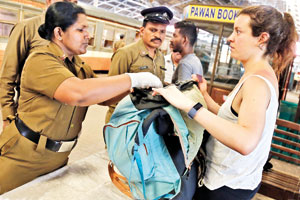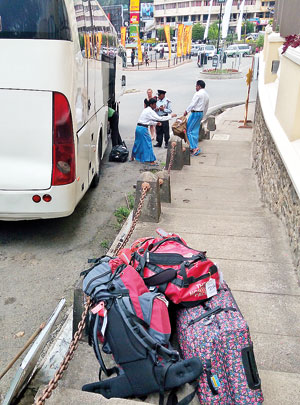News
Tourism industry insists on security to recover
View(s):
Security is paramount: Many welcome baggage and body checks Pic by M A Pushpa Kumara
Tourism received a body blow from suicide attacks by Islamic extremists on Easter Sunday and the subsequent travel warnings issued by many countries.
The president of the Colombo City Tourist Hotels Association, Mr M Shanthikumar said about 80% of hotel reservations had been canceled in Colombo.
“The biggest problem the industry is facing at the moment is the travel warnings,” he said.
He said this must be addressed immediately by the government, with the support of hotel associations and other service providers.
“Lowering prices and other strategies would be fruitless unless security is re-established,” said Mr Shanthikumar.
Hotels have strengthened security for guests, he said. Some have installed walk-through sensors in addition to doing thorough baggage and body checks.
Mr Saliya Dayananda, president of the Cultural Triangle Hoteliers Association and co-chair of the Association for Dambulla and Sigiriya Tourism Promotion, said sales have shrunk by 80%.
He said bookings in May and June are generally low, but the bombings meant that bookings are virtually non-existent.
“Generally between May-June, hotels are at 40%-50% of their maximum capacity, but now they are facing numbers as low as 5%-10%.’’ Even local travellers have dropped off.
Mr Dayananda said that, on average, in the off-season his establishment generates Rs250,000 daily, but this has dropped to Rs135,000 for three days.
He said his main concern is those in the industry who have borrowed from banks, and suggests the government impose a moratorium on interest based payments and EPF/ETF payments along with government taxes, as well as electricity and water charges.
He said most hotel workers in the area have been given paid leave. “Employees are bored as there are no guests, and no work to do.”
Many businesses serving tourism and travel, such as wildlife excursions, safaris, and other activities have also suffered, he said.
Mr Shamindra Fernando, president of the Galle Hoteliers Association, believes in being positive despite the obstacles.
The industry must take measures to ensure the adverse effects on the main tourist visiting season are minimised, he said. He laid out three specific steps. Security is paramount, he said. “Without the country being secure nothing can happen.”
Sri Lanka must say with one voice that it is a safe destination.
“Lastly, we must implement advertising campaigns and various forms of propaganda effectively. Things like complimentary hotel stays and free airline tickets must be offered.”

Security procedures are to be boosted Pic by Shelton Hettiaarachchi
Mr Fernando said the industry will rebound in about one-and-a-half months, if security is re-established. But, he was not positive of a recovery, if another attack happens.
The US, UK, Australia and Canada have issued warnings to avoid non-essential travel to Sri Lanka. “Reconsider travel to Sri Lanka due to terrorism,” was a commonly seen tagline across trip advisory sites.
“The Foreign and Commonwealth Office (FCO) advises against all but essential travel to Sri Lanka, due to the current evolving security situation following attacks on 21 April 2019,” reads the opening line of a web-update issued by the UK.
“Terrorists are likely to carry out further attacks in Sri Lanka. Attacks could be indiscriminate, including in places visited by foreigners,” said the Australian Government’s trip advisory. Travel agents see these warnings as the biggest obstacle.
A managing director of a travel agency added that tourists would not be able to claim insurance if something were to happen to them while in Sri Lanka. The spill-over of the bombings will affect the handicraft and catering industries, he said. He believes the industry will recover.
The director general of Sri Lanka Tourism Development Authority Mr Upali Ratnayake, said the main concern is national security. He said a cabinet sub-committee has been formed to address issues. “The changes will be implemented depending on how quickly they make submissions to the cabinet.”
Security procedures will be boosted at hotels, advanced scanners and security equipment will be installed at airports, and a news app will be launched for tourism services providers, he said.
Mr Ratnayake said authorities intend to provide relief through initiatives such as exploring the possibility of allowing delayed loan and interest payments and providing soft loans for hotels that need funds to cover upcoming payments.
“Finally, we plan publicity campaigns to tell visitors they can come to Sri Lanka again,” Mr Ratnayake said. Not just in Colombo, but there were few visitors elsewhere. On Friday, only 40 visitors were at Sigiriya in contrast to 3,500 local and foreign tourists who come on a weekday.

